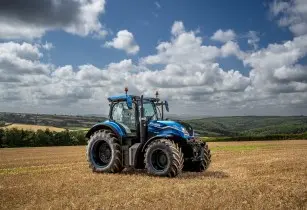On 9 December, New Holland Agriculture unveiled the next step in its Clean Energy journey with the T7 Methane Power LNG (Liquefied Natural Gas) pre-production prototype tractor
New Holland Agriculture brand has long championed alternative fuels as the future of farming, establishing its Clean Energy Leader Strategy in 2006. Since then, the brand has accumulated vast experience and expertise in this area, developing concepts, prototypes and ultimately the first ever commercialised natural gas tractor.
Natural gas, and especially biomethane, are presently the ideal solutions to guarantee higher horsepower machine performance, while also lowering emissions and reducing operating costs.
The T7 Methane Power LNG will more than double the autonomy compared to a CNG design while also boosting overall farm sustainability. In comparison to the T6 Methane Power CNG, this is a fourfold increase in fuel capacity. LNG is also a key facilitator for the expansion of CNH Industrial’s broader future natural gas portfolio, particularly towards larger and heavier agricultural equipment, as well as construction equipment.
The pre-production prototype offers unparalleled performance for an alternative fuel tractor. With its 270 hp, it delivers the same power and torque as a diesel tractor while delivering autonomy without the need for any extra tanks. It is also more sustainable, being better than carbon neutral when powered by liquefied biomethane sourced from livestock manure/slurry.
To spearhead this latest development, CNH Industrial partnered with Bennamann, a UK-based expert in solutions to capture and repurpose fugitive methane emissions for energy use. Bennamann’s multi-patented approach prevents methane from entering the atmosphere by ultimately converting it into Liquefied Fugitive Methane (LFM) for use as a ‘better than zero carbon’ biofuel. This solution can significantly reduce the carbon footprint of an average dairy farm by preventing the direct emission of methane from slurry lagoons and tanks, as well as providing a range of additional benefits which include a reduction in the use of CO2 intensive chemical fertilisers, a displacement of fossil fuel use in tractors, electricity generation and heat provision, and reduction in the need for slurry spreading.
It works by transferring collected livestock manure to a covered slurry lagoon or tank, where the emitted fugitive methane (alongside other polluting gases) is captured, subsequently purified and converted into liquefied methane with the help of a processing unit. A liquification unit can simply be bolted on to an existing CNG processing unit for further flexibility, especially being ideal for farms which already produce their own biomethane.
Bennamann’s patented non-venting cryogenic storage tanks keep the methane as a liquid at -162°C, producing a new source of clean power for the T7 Methane Power LNG tractor. Furthermore, this technology enables LNG to be transported, similar to diesel, to wherever it is required, meaning farms which do not have the ability to produce LNG on-site can still benefit from its advantages, as well as enabling flexible in-field refueling during intense operational windows. The tractor’s surrounding environment also benefits from a significant reduction in drive-by noise levels, making it perfect for tasks near livestock or in urban areas.
The combined expertise and resources of CNH Industrial and Bennamann therefore enable farmers everywhere to fully integrate this scalable and affordable energy independent system on their farms while also providing new opportunities and revenue streams to monetize or repurpose their waste. Moreover, this machine is equipped with bold and functional future-facing enhancements. All of the new technology present in the T7 Methane Power LNG has been put through its paces on a variety of farms across many different applications.





